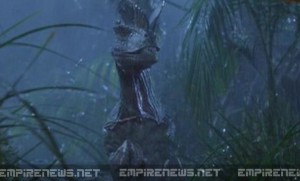Fresh on the heels of her discovery of a new species of flying spider, Professor Althea Thoone stunned the scientific community once again with her announcement that scientists in Austria, working in conjunction with geneticists in the United States, are “months away” from successfully cloning a dinosaur.
The discovery of pre-historic dinosaur dung in a hilly region of Austria was the first step in the long road toward the eventual cloning experiments, as Dr. Thoone explained during an international teleconference. “Once we found the dinosaur poo,” said Professor Thoone, “the question then became, ‘could we find some biological matter within that was not fossilized?’ One of my Austrian colleagues joked ‘Now we’ve put our foot in it!’ He had the lecture hall in stitches.”
Scientists in Austria were able to extract genetic information from the dung by a process very close to what oil and gas engineers in the U.S. call “fracking,” or hydraulic fracturing.
“This was a much like a ‘fracking’ operation, but on a much smaller scale,” explained Dr. Thoone. “It was a fascinating process,” she added.
A series of chemicals was injected into the fossilized dinosaur dung until a solution could be extracted and examined through a spectrometer. Once the spectrometer read the information, technicians were able to identify which dinosaur had produced the dung, and whether or not material necessary for the duplication could be obtained.
“As luck would have it,” explained Prof. Thoone, “we were able to extract enough material from the dinosaur feces to give us enough genetic material to produce a viable dinosaur clone!”
The dinosaur that left his or her droppings for scientists to enjoy roughly 193 million years ago was a Dilophosaurus from the Early Jurassic Period, a dinosaur most people will recognize as the “frilled neck” creature they saw in the Stephen Spielberg film Jurassic Park.
The scientific community is awaiting the results of the Austrian cloning experiments with the kind of anticipation not felt in decades.
“We’re all very excited,” said Prof. Thoone. “First flying spiders, and now, the reappearance of a dinosaur that roamed the earth nearly 200 million years ago! We foresee having some fascinating results to announce to the world very, very soon!”





























